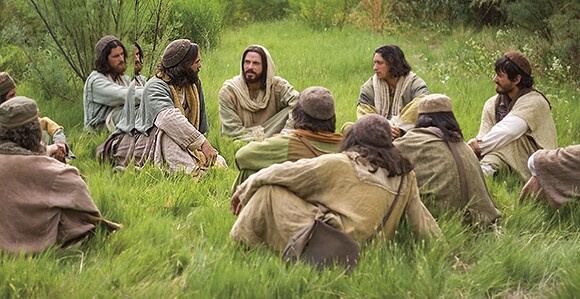“Hello! How are—?”
“Hi.”
Another blunt response cut off our hopeful greeting. Our neighbors bustled by with their groceries, avoiding eye contact as they retreated into their apartment.
My husband and I stood on the stairway for a moment, looked at each other, then shrugged. We were newlyweds at the time, and another evening hanging out together in our one-room apartment wasn’t so bad. He loved me enough to continue losing terribly at Scrabble, and I loved him enough to continue, well, almost winning at chess.
We’d gotten married at the height of the pandemic, a time when social interactions took a masked nosedive into the abyss of awkwardness. And although we enjoyed spending so much time together, we did ache to feel like we belonged in our new ward.
Determined to make friends at church, my husband and I soon adopted a mentality offered to us by a wise young sage. Her advice was not just a spiritual lifeline during 2020. It has proven life-changing in each new ward we’ve attended to this day—and it has completely altered my incentive to go to Church.
“Just play with them”
Years ago, a group of us were hanging out in the backyard of one of our friends. His niece—I’ll call her Sophie—was there, a bubbly four-year-old in a twirly blue dress who ran around making confident declarations like, “I love singing and dancing because it brings me joy,” and “I can show you how to pick raspberries without poking your fingers on bumble bees.”

One of our friends was getting ready to move to Texas. We teased him about how hard it would be for him to make new friends who were as cool as us. Everyone also acknowledged that, in general, making new friends was difficult.
Jokingly, I asked Sophie, “Hey, how do you make friends? What’s the secret?”
She stopped dancing in the grass and looked at me like I’d asked her what color the sky was. She held up her hands, “Uh, just play with them.”
Apparently accustomed to helping adults understand very obvious things, she shrugged and danced away.
Her unexpectedly profound words became a phrase that would echo in my mind every time I found myself being shy or awkward. (In other words, I think of them quite frequently.)
“Just play with them.”
My husband and I mused about that concept on the way home that night. We reminisced about the days when finding a friend at school or church simply meant choosing someone to “just play with.” Why did it have to be so different for adults?
Was it really so different?
There were real challenges, like trying to join groups of already-established friends in the ward. But we also knew that there were dozens of newlywed couples in the same situation as us. People wanted to connect with each other. They just didn’t know how.
So, we decided to “just play with them.”
“Belonging comes not as we wait for it but as we reach out.”
With Sophie’s advice in mind, my husband and I got to work. We began inviting random couples from our married-student ward over to our apartment for dinner and a board game. Anyone and everyone who felt comfortable coming was invited.
Some dinners were a blast; we talked easily, and we laughed hard. Some dinners were a total bust; conversation lagged, and jokes didn’t land. It was a lot of work, especially on days when I felt shy or tired. We certainly didn’t click with everyone. Still, we were already starting to feel a deeper sense of belonging in our ward.
We also started seeing a gradual change in the ward as a whole. Other couples, like us, got tired of being lonely and went out of their way to just invite people over.
Several local leaders remarked on how high Church activity and attendance had risen in that ward. Some asked what the secret was, and the answer was simple: We were friends; we wanted to be around each other. People came to church because they knew they belonged.
Let me pause here and address the deceptively idyllic elephant in the room: It was not Zion. We weren’t all besties. Some people were still lonely. Some groups were still cliquey. And I’m aware that our experience in that married university student ward was situationally abnormal. Family wards and branches have so many more dynamics at play, with members of all ages in all chapters and walks of life.
► You may also like: 4 blessings from treating your ward family like your actual family

All of that being said, my husband and I have seen the “just play with them” principle hold true, no matter where we’ve lived. In fact, we recently had dinner and played card games with new friends from our current, much older ward (where the average age, from newborns to ninety-year-olds, is approximately 62 years old). No amount of birthdays or life experience can make someone too old or too different to enjoy food, games, and good company.
You don’t have to host weekly dinners or be board game enthusiasts. That’s just what my husband and I happen to enjoy. With some of our new, older ward friends, we’ve also enjoyed going on walks, bringing them flowers, or picking produce together.
Everyone wants friends, and everyone wants to feel that they belong at Church. That sense of belonging can’t be cultivated by mere proximity, pew to pew. Friendship blossoms from shared experiences, and time spent together doing something. Like “just playing.”
“Ye are my friends”
From what I can tell, the doctrine of friendship is very dear to the Savior; He knows that shared experiences—time spent together as individuals and families—bring communities together, regardless of differences that would deceptively divide us.
In the New Testament, Jesus’s disciples were men and women from all backgrounds. Fishermen, political activists, publicans, all from a variety of social ranks—one couldn’t have been more different from the next. I imagine that sometimes, if not often, they felt at odds with one another.
We don’t know the details, but I do know this: Jesus tells His disciples, both ancient and modern, “If ye are not one, ye are not mine.” Following Him means allowing ourselves to grow close together, as Christians. Meaningful relationships are at the heart of His gospel.
Toward the end of His mortal ministry, He tells the disciples, “Ye are my friends.”
You have become friends. You are mine.

Can you imagine, all of the memories, the heartaches, the arguments, the wonders, the jokes, the experiences, the hopes and fears and joys that must have flooded each of the disciples’ minds when they heard the Savior of the world say, “Ye are my friends”?
I think those words tell us a lot about the effect of their time spent together and about the effect of our time spent together in communities of faith today. Yes, we gather for ordinances, service, and doctrinal discussions, but we also gather for social strength and connection.
Thanks to Sophie, I now approach Church with the “just play with them” mentality. Some days that means going out of my way to visit or invite someone over. Other days, it just means sitting by someone at church who looks lonely, even if I don’t feel like talking.
Time and time again, this mindset deepens my understanding and sense of belonging: I belong among the disciples of Christ, and I belong to Him.
Jesus Christ is masterful at facilitating friendship; His restored Church proves that in countless ways. He also frequently reminds us that His gospel is best applied through the eyes of a child. We have a lot to learn from people like Sophie.
▶ You may also like: Craving connection? Follow these 3 Christ-centered principles

